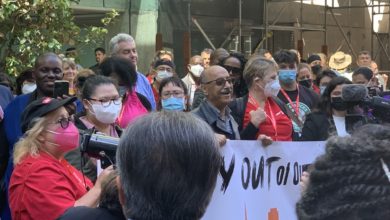After
14 days of the hunger strike organized by the inmates in the Security
Housing Unit of California’s Pelican Bay State Prison, at least
6,000 prisoners in SHUs and from the general population in 13 prisons
have gone on hunger strike. It has been reported that the health of
some strikers is rapidly deteriorating, but the California Department
of Corrections and Rehabilitations has refused to negotiate with the
strikers.
These
inmates have taken decisive and courageous action to fight for basic
human needs. The Party for Socialism and Liberation supports the
expansion of the hunger strike and will continue to support the five
core demands to end inhumane conditions and long-term isolation. As
the statement says below:
“What
is of note here and something that should concern all U.S. citizens,
is the increasing use of behavioral control, i.e. Torture units and
human experimental techniques against prisoners, not only in
California but across the nation. Indefinite confinement, sensory
deprivation, withholding food, constant illumination and use of
unsubstantiated lies from informants are the psychological billy
clubs being used in these torture units. The purpose of this
‘treatment’ is to stop prisoners from standing in opposition to
inhumane prison conditions and prevent them from exercising their
basic human rights.”
of Solidarity with the Pelican Bay Collective Hunger Strike on July 1
and announcement of participation by Corcoran SHU prisoners.]
The
United Nations and international justice courts have ruled that
long-term isolation and sensory deprivation are torture, yet many
working-class and poor people, especially people of color, are
subjected to it in California and nationally in the prison industrial
complex.
Prisoners
in the SHU can be held for indefinite periods for alleged “gang”
affiliation, which is arbitrarily determined. SHU inmates, especially
those at PBSP, the front runner in super max prisons, suffer daily
violations of their First, Fifth, and Eighth Amendment rights,
especially their right to be free of punishment for their association
with other prisoners and their right to freedom of speech.
According
to the Pew Center on the States study, in 2008 approximately one in
every 31 adults (7.3 million) in the United States was behind bars or
on probation or parole. In 2008, the breakdown for adults under
correctional control was as follows: one in 18 men, one in 89 women,
one in 11 African-Americans (9.1 percent), one in 27 Latinos (3.7
percent), and one in 45 whites (2.2 percent). People of color make up
70 percent of prisoners in the United States .
California
has seen its prison-related spending swell to $10.6 billion dollars
annually—or 9.7 percent of the state budget, more money than the
state spends on higher education (5.9 percent). While spending on
higher education has declined by two-thirds since 1967, spending on
prisons has tripled.
While
state workers face furloughs, prison guards like police officers
receive some of the highest salaries. These salaries have not been
slashed during this economic crisis, because they serve the
capitalist class’s interests by repressing some of the most
vulnerable elements of the working class. But it is not working, as
the hunger strikers’ courage exemplifies.
As
Luis “Bato” Talamentez, long-time prison rights activist, says
regarding the increase in inmate support and action: “Prisoners on
strike at Pelican Bay and elsewhere within the PrisonIndustrial
Complex have thought long and hard on taking on this direct action to
seek desperate relief from their awful inhuman plight of existence.
We the public must stand up for human rights now more than ever as
the cruel PrisonIndustrial Complex will most likely allow prisoners
to starve and die unless public support is forthcoming in a hurry.”
There
are ongoing vigils in solidarity with the hunger strikers on
Thursdays from 5 to 7 p.m. in front of the Alameda County
Courthouse.
Hey,
hey, ho, ho, the prison industrial complex has got to go!





